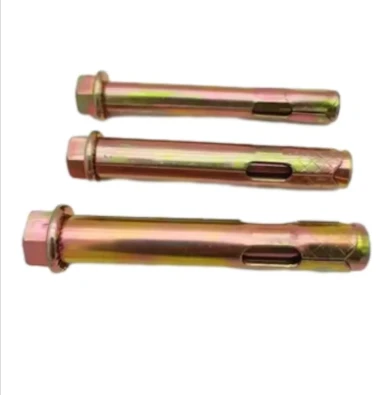Ara . 04, 2024 06:21 Back to list
Choosing the Right Sizes for Chemical Anchor Bolts in Construction Projects
Understanding Chemical Anchor Bolt Sizes A Comprehensive Guide
When it comes to construction and engineering, the choice of fasteners plays a crucial role in ensuring structural integrity and safety. Among various types of fasteners, chemical anchor bolts have gained popularity in recent years due to their versatility and strength. Understanding chemical anchor bolt sizes is essential for anyone involved in construction projects, whether you're an engineer, contractor, or DIY enthusiast.
What are Chemical Anchor Bolts?
Chemical anchor bolts are specialized fasteners that use a bonding agent—often a type of epoxy—to create a secure connection between the bolt and the substrate, typically concrete or masonry. Unlike traditional mechanical anchors, which rely on expansion or friction, chemical anchors achieve their strength through chemical bonding. This makes them particularly useful in scenarios where traditional anchors are unsuitable, such as in cracked concrete or in applications requiring high load capacities.
Importance of Anchor Bolt Sizes
One of the key considerations when selecting chemical anchor bolts is their size. The size of an anchor bolt affects its load capacity, installation depth, and overall effectiveness. Choosing the appropriate size is vital for the following reasons
1. Load Capacity Each size of anchor bolt has a specific load-bearing capacity, which dictates how much weight it can hold. Selecting an undersized bolt can lead to failure, while using an oversized bolt unnecessarily increases costs.
2. Installation Requirements The size of the bolt determines the drill hole diameter and the depth of anchorage required. Proper planning in terms of size allows for efficient installation and minimizes the risk of damaging the substrate.
3. Compatibility Ensuring that the bolt size is compatible with other components of the construction project, including the supports, beams, or structural elements, is crucial for maintaining overall stability.
Standard Sizes and Specifications
Chemical anchor bolts come in various sizes, typically measured in diameter and length. Common sizes include diameters ranging from 10 mm to 30 mm, with lengths varying from 70 mm to 300 mm or more. Different manufacturers may offer additional sizes to cater to specific needs.
When selecting the appropriate chemical anchor bolt size, it is essential to consider several factors
chemical anchor bolt sizes

- Concrete Strength The compressive strength of the concrete influences the anchor's load capacity and size selection
. Higher-strength concrete can accommodate larger or fewer anchors.- Environmental Conditions Exposure to chemicals, moisture, and temperature fluctuations must be assessed. The size and type of anchor bolt might vary based on whether it will be used indoors or outdoors and the specific environmental conditions it will face.
- Type of Loading Understanding whether the load is static or dynamic is critical. Dynamic loads require robust anchors that can withstand motion and vibrations.
Installation Best Practices
Proper installation is paramount for ensuring the effectiveness of chemical anchor bolts. Here are some best practices
1. Hole Preparation Drill according to the specifications of the selected bolt size, ensuring the hole is clean and free of debris.
2. Mixing the Adhesive Follow the manufacturer's guidelines for mixing the chemical adhesive thoroughly to ensure optimal bonding.
3. Setting the Anchor Insert the bolt into the hole with the appropriate torque settings as recommended by the manufacturer to achieve the desired load capacity.
4. Curing Time Allow adequate time for the adhesive to cure before subjecting the anchor to load. Curing time can vary based on temperature and humidity conditions.
Conclusion
Chemical anchor bolts are integral to modern construction, providing unparalleled strength and versatility. Understanding the different sizes available and their specific applications is essential for achieving optimal results in engineering projects. By considering load capacities, environmental conditions, and installation best practices, professionals can ensure that their projects are safe, efficient, and durable. Whether you are a seasoned contractor or a newcomer to the construction industry, familiarizing yourself with chemical anchor bolt sizes will prepare you for success in any building project.


